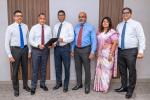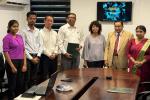Erasmus Mundus is a highly sought after cooperation and mobility programme funded by the EU offering students a choice of study linking with 19 other European Union and Asian Universities.
This project (SMARTLINK) aims to strengthen the existing partnership and foster new partnerships between universities from EU,South Asian countries and Eastern countries by realizing the student and staff mobility in both ways.
Through the project grant, SLIIT has been awarded nine mobility activities for students and young researchers. Which include all levels of study: bachelors, masters, doctorate and post-doctoral studies. A total mobility of 120+40 persons is aimed during the 48 months running period of the project.
The European Union has chosen SLIIT, from among 22 regional partners, for the prestigious Erasmus Mundus Action II project as the only non-state sector institution, underscoring the Institution’s commitment to fostering a vibrant environment for research.
The Erasmus programme will provide SLIIT the basis for collaborative research strengthening relationships with more foreign universities. In addition, to the nine mobility activities, the project will also grant SLIIT funding with €5000 to manage all the promotional and administrative activities with the programme.
The Erasmus Mundus programme provides support through three main levels:
To higher education institutions that wish to implement joint programmes at postgraduate level or to set-up inter-institutional cooperation partnerships between universities from Europe and targeted Third-Countries;
To individual students, researchers and university staff who wish to spend a study / research / teaching period in the context of one of the above mentioned joint programmes or cooperation partnerships and To any organisation active in the field of higher education that wishes to develop projects aimed at enhancing the attractiveness, profile, visibility and image of European higher education worldwide.
Launched in 2004, this significant European Commission
initiative
aims
at contributing
to
building
bridges
between Europe
and
Asia
and
towards
the
promotion
of
economic, cultural
and
scientific
exchanges.
As the only non-state category organization, SLIIT has been selected under this highly sought after EU funding stream offering students a choice of study, linking with 19 other European Union and Asian Universities.
Sri Lanka’s University of Peradeniya is listed as the only local University as an associate of the project. “We are very pleased that SLIIT was chosen for the Erasmus Mundus Action II Project.
The awarding of such a programme to a university is widely considered to be in recognition of that institution’s excellent academic record,” noted Professor Lakshman Ratnayake, Chairman, SLIIT.
The Erasmus Mundus is a cooperation and mobility programme in the field of higher education that aims to enhance the quality of European higher education and to promote dialogue and understanding between people and cultures through cooperation with developing countries.
“As a premier degree awarding institute we are elated that SLIIT has successfully undergone the stringent application procedures and proven academic quality, progressing to the acceptance stage of the grant.
Participating in this programme will reinforce and enhance its reputation as a centre of excellence.” said Professor Lalith Gamage, President and CEO, SLIIT.
“Through this programme we are not only strengthening ties with foreign higher education institutes but also becoming stronger in the field of research and development.” Professor Gamage added.
According to the Project, thematic fields that have been identified for study include; Agricultural Sciences, Architecture, Urban and Regional Planning, Business Studies and Management Sciences, Education, Teacher Training, Engineering, Technology, Geography, Geology, Law, Medical Sciences, Natural Sciences, Social Science and Other Areas of Study.























